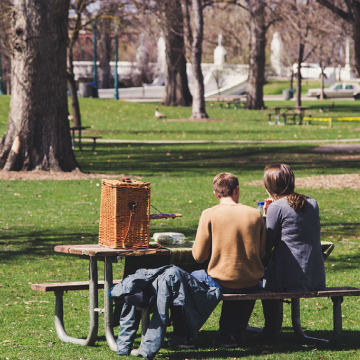SEED Program Continues to Foster Connection During COVID-19 Pandemic
"A Lifelong Connection"
By Annie Krall
The feeling of being reunited with our friends and family is one that brings a lot of joy, especially during the pandemic. This summer, a group of 10 former Support and Education for Early Dementia (SEED) participants felt that joy as they reunited after months of only seeing each other on screen.

The group originally met during the eight-week SEED Program in Fall 2018, and continued to meet weekly over lunch downtown. When social distancing was implemented, instead of meeting over lunch, they checked in with each other over Zoom, but it wasn’t the same
“We weren’t going to lunch which was a big downer for all of us because we loved going to lunch together,” said Terry Passaro, SEED Program participant and wife and care partner of Lanny Passsaro. explained. Passaro appreciated the robust social life SEED gave both her and Lanny.
The group hosted a picnic at Denning Park in La Grange, with each pair of attendees bringing their own food, beverages, and chairs.
“It was so joyful,” Passaro said. “Toward the end of the picnic, somehow, one of the ladies brought out a frisbee. Passing that around was a little energetic for the group and it was great. We had a wonderful time.”
Just being in person together, talking, and listening to the birds sing, meant so much to the group.
“The picnic came about because we had just about lost our minds with not being face-to-face with everyone in the group,” Passaro said. This group originally formed during SEED, the Mesulam Center’s eight-week research program for people recently diagnosed with mild cognitive impairment or early-stage dementia and their care partners.
Social isolation is a challenge many older people face, but is especially exacerbated during this time and can be exponentially worse without the means to connect with friends and family using technology. A struggle many individuals living with dementia face.
“People don’t understand the type of isolation you deal with when you don’t have an understanding of computers or cell phones,” Passaro said. She does communicate virtually but is unable to teach Lanny how to use electronics to his advantage. “When they don’t have the modern-day connections with their friends...the loneliness is hard to express.”
Luckily, Lanny has both Terry and the Mesulam Center on his side. “I feel, and I think all of us in the SEED group feel, that the Mesulam Center is always there for us,” Passaro highlighted. “There is always an answer, a response, some help, or a place to go with the Mesulam Center.”
The SEED program, like many of the Mesulam Center’s Quality of Life Enrichment Programs, is funded by the Glen and Wendy Miller Family Foundation. The impact of their donation has allowed for a bright future when it comes to the SEED group that keeps on growing. The group is planning more physically distanced gatherings, yet, the group’s comradery will likely outlast the picnic season and the pandemic. “We are so grateful to the Mesulam Center because they formed us.” Passaro said. “It is going to be a lifelong connection, we all feel that way.”
Photo by Brett Sayles from Pexels